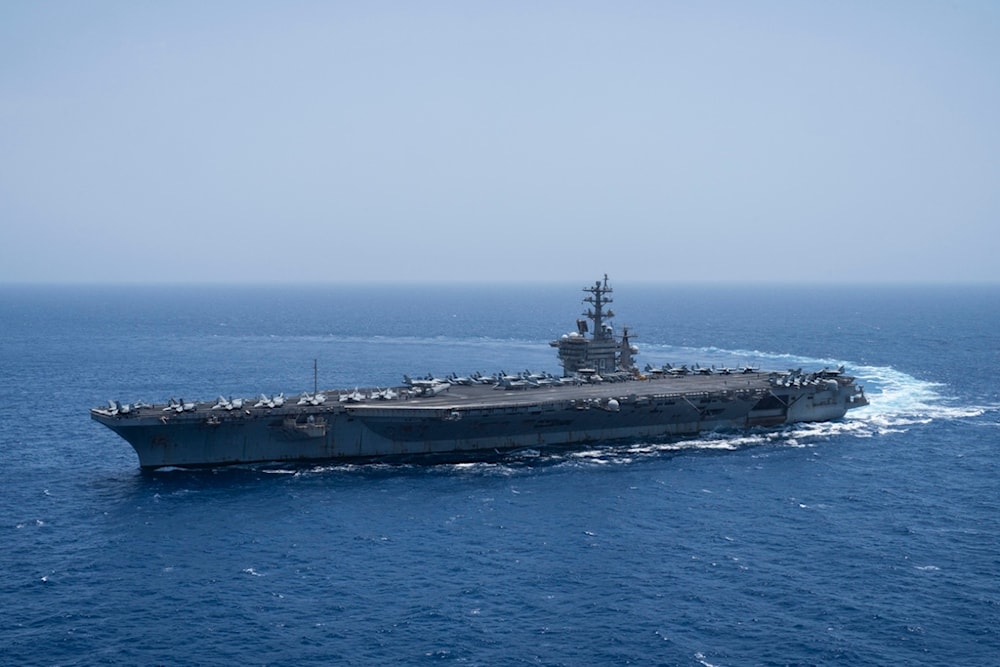US, allies failed to stop Yemeni attacks: Axios on US intelligence
According to updated US intelligence assessments, container shipping through the Red Sea has plummeted by approximately 90% since mid-February, disrupting 10-15% of global maritime trade.
-

The USS aircraft carrier Dwight D. Eisenhower, also known as 'IKE', sails in the Red Sea on Wednesday, June 12, 2024. (AP)
Axios cited a recent US intelligence report detailing the impact of Yemeni operations on international trade, highlighting that Yemenis have seized a vital commercial waterway hostage using drones and missiles.
It also criticizes the US and its allies for failing to halt Yemeni attacks in the Red Sea and the Gulf of Aden.
According to the report, these operations impose substantial economic costs, affecting more than 65 countries and prompting major shipping and energy firms to reroute their operations away from the region.
Container shipping through the Red Sea has plummeted by approximately 90% since mid-February, disrupting 10-15% of global maritime trade, while insurance premiums for ship transits have surged to 1% of vessel values during the same period.
Alternative routes around Africa add 11,000 nautical miles and require up to two weeks of travel time and $1 million in fuel on average.
The attacks, which commenced late last year, have targeted both commercial and military Israeli-linked vessels, resulting in over a dozen commercial ships being struck between November and March.
Several hijacking attempts have also been reported, the report notes, adding that the March sinking of the British-owned cargo ship Rubymar, carrying 21,000 metric tons of fertilizer, raised concerns about potential ecological disasters.
The report notes that the US Navy has spent $1 billion on ammunition to counter ballistic missiles, cruise missiles targeting ships, and explosive drones in the region.
It also alleges that humanitarian aid to Gaza has been delayed due to Yemeni operations.
Behnam Ben Taleblu of the Foundation for Defense of Democracies told Axios that the conflict is as much a political challenge as a military one, as he alleges Iran to be involved in Yemeni operations.
Read more: US Navy faces most intense combat against Yemen since WWII: AP
It is worth recalling that transit in the Red Sea remained relatively stable for non-Israeli-affiliated ships until the US and the UK launched their naval coalition against Yemen.
Moreover, Iranian authorities have reiterated several times that they are in no way involved in Yemeni operations. EU Foreign Policy Chief Josep Borrell has himself remarked that the Ansar Allah is "quite autonomous."
On a related note, humanitarian aid in Gaza has been delayed not due to Yemeni operations but rather to the Israeli blockade aimed at starving the population in the Strip.
Months of severe hunger have resulted in the deaths of numerous Palestinians in Gaza and have inflicted lasting harm on children due to malnutrition, all transpiring prior to the official declaration of famine.
Palestinian media reports indicated that over 37 children have succumbed to starvation amid the ongoing Israeli aggression, with fatalities occurring in various hospitals throughout Gaza. Notably, Kamal Adwan Hospital has recorded approximately 30 child deaths due to this cause.
Read more: TUTOR vessel struck by Yemen is sinking, crew abandoned ship: CENTCOM

 3 Min Read
3 Min Read








